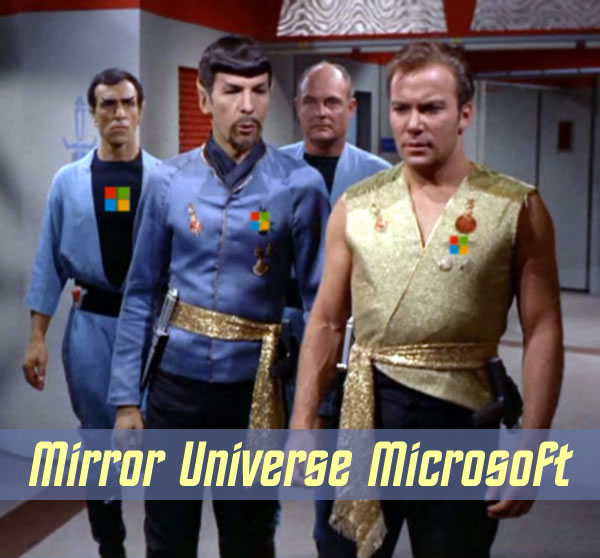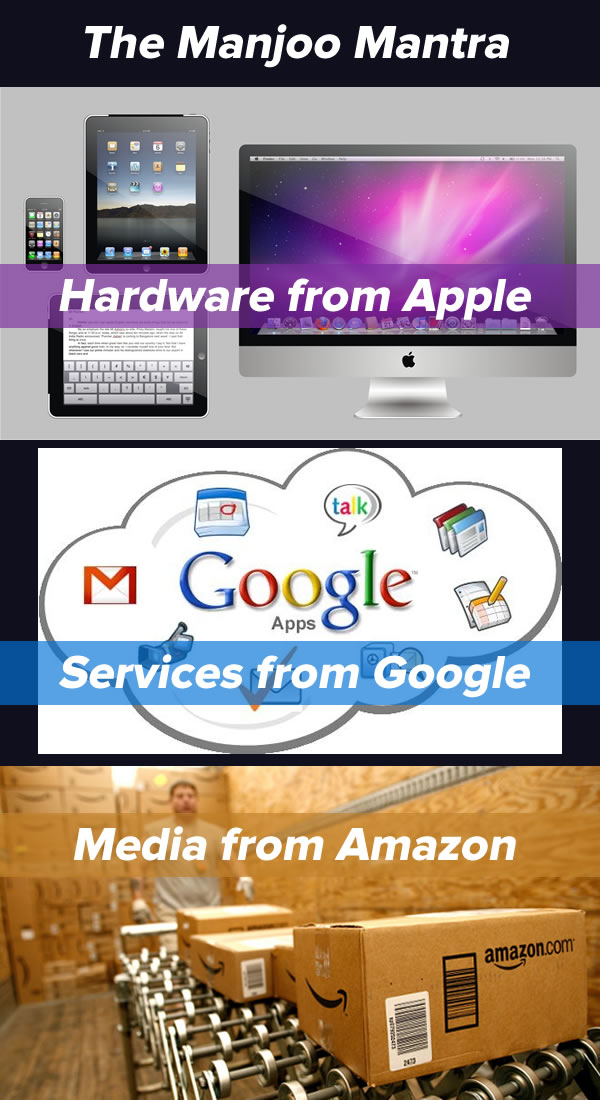
There’s a classic Star Trek episode in which a transporter malfunction beams Kirk, McCoy, Uhura, and Scotty to a “mirror universe” where everyone has an evil counterpart. In the mirror universe, the Enterprise isn’t a ship of exploration but war and conquest, the peaceful Federation is the hostile Terran Empire, and Evil Mr. Spock is wearing the dreaded Beard of Evil. If you’ve never seen it before, or are itching to see it again, someone’s posted it on YouTube, and I’m posting it below. Enjoy it before Paramount issues the takedown:
We don’t live in a world of starships and transporters, but Microsoft’s head of PR, Frank X. Shaw, the company’s answer to the Iraqi Information Minister, just might. The latest evidence for this came to light in his response to Farhad Manjoo’s first column for the New York Times.
In his column, How to Survive the Next Wave of Technology Extinction, Manjoo writes:
By following a simple strategy, you can get the most out of the digital world while reducing the chance you’ll be burned by a single wrong move. The point is to minimize the danger of getting locked in to any one company’s ecosystem. The strategy also ensures that you can easily move from device to device without much hassle.
The key is promiscuity. When you decide what to use, you’ve got to play every tech giant against the other, to make every tech decision as if you were a cad — sample every firm’s best features and never overcommit to any one.
Here’s his strategy, boiled down to three lines, which I’ve dubbed “The Manjoo Mantra” and to which I’ve added those lovely graphics that you’ve come to expect from this blog:

Manjoo’s approach is my approach, and if you talk to your local alpha geek, and the odds are pretty good that s/he’s following it as well. From informal nerd gatherings like Toronto’s Rails Pub Nite, to more organized get-togethers like DevTO, to the Toronto and Ottawa offices of the billion-dollar ecommerce business Shopify, to the San Francisco Bay Area, from small startups working out of their kitchens or at cafes, to operations ranging from Stripe to Dropbox to Google (all places where I’ve interviewed in the past little while), it’s the same: hardware from Apple, services from Google, media (and often, other tangible goods from Amazon).
I do keep a Windows 8 machine handy just in case there’s some Windows-specific work to do — a Lenovo T430, which I call the “StinkPad” — but at this point, it’s relegated to secondary tasks such as email, Skype, audio and video playback, torrenting and other joe-jobs so that the main computer, an early 2011 MacBook Pro has maximum free cycles to do real work. At this point in the game, most of my Microsoft user experience comes from my trusty Xbox 360, and the occasional Office document (which I open on the Mac), and doing tech support on aging friends’ and relatives’ aging home computers (a good number of which run Windows XP).

Note that Microsoft doesn’t appear at all in the Manjoo Mantra, and that’s not the sort of snub that Frank X. Shaw, Corporate Vice President of Corporate Communications (that’s right, the word corporate appears in his title twice) gets paid big bucks to take lying down. He published one of those “open letter” replies to Manjoo’s column in Business Insider, which I include in its entirety below:
Dear Farhad,
When you wrote for Slate, you often championed new emerging technologies that offered the tantalizing prospect of disrupting static markets by putting more power and choices into the hands of the people who use them. So naturally, I was a little confused when I opened the paper of record this morning to find that along with switching your employee badge, you seem to have switched sides, and are now a firm supporter of the status quo.
I’m referring, of course, to your advice column for consumers wishing to avoid “tech extinction” by betting on the wrong horse. Surprisingly though, your predictions seem like you are using a rear-view mirror, not a windshield, to look at the road ahead. You recommend sticking with today’s biggest players in the mobile phone, web services and content marketplaces, diversifying purchases between Apple, Google and Amazon accordingly. The core argument for doing this seems to be that none of these companies are likely to go away, and that spreading your bets reduces the risk of “lock in.”
Ironically, these recommendations do lock you in. To expensive hardware with fewer choices and to aggressive content screening and intrusive advertising.
More importantly though you are discounting the possibility that the best antidote to extinction is actually betting on players who are innovating today, not simply monetizing the products they invented 5 or 10 years ago. Your own advice would have had a 2007 smartphone buyer picking a BlackBerry over an iPhone, a 2001 gamer buying a Dreamcast instead of an Xbox, and a 2008 social media user putting all their contacts into MySpace, not Facebook. This would have look like sound advice at those moments in time, but of course it wasn’t. Not because those products were bad, but because they had already peaked, and were no longer focused on solving customer problems in fresh new ways. The best way to avoid extinction is betting on a commitment to evolution through innovation.
So while your readers could take your advice and blend in with the current crowd, we’d encourage you (and them) to take a look at some alternatives that offer even better ways to get things done. And with a cross-platform connected ecosystem that spans the workplace to the living room featuring best in class products like Office, Skype and Xbox, we’re a pretty safe bet too.
fxs
If you have any grasp of the history of tech over the past twenty years, your reaction is probably similar to this:

Think about it:
- For a Microsoftie to warn of the dangers of lock-in is rich beyond belief. Lock-in is what made made Microsoft; its association with Microsoft is strong enough for it to get mention in Wikipedia’s entry for “Vendor Lock-In”.
- He cites examples of innovative, disruptive, industry-redefining products, but can’t point to a single Microsoft product of that ilk (and for the record, a 2001 gamer’s smart bet would’ve been the PlayStation 2, not the original Xbox).
- He says the Manjoo’s pitching products that have “already peaked” made by companies “monetizing the products they invented 5 or 10 years ago”, yet what business is Microsoft really in, if you look at their revenues? Windows and Office, both of which come from the ’90s. Besides, the current version of Windows sold 100 million fewer copies in the first 15 months than its predecessor in the same period of time.
I admire the bare-knuckle yet tactful way in which Shaw deals with bad PR for Microsoft, but he’s living in an alternate reality. In that parallel universe, I’d have gladly stayed in Microsoft, evangelizing an industry-redefining, disruptive, successful Windows Phone and Surface Tablet.